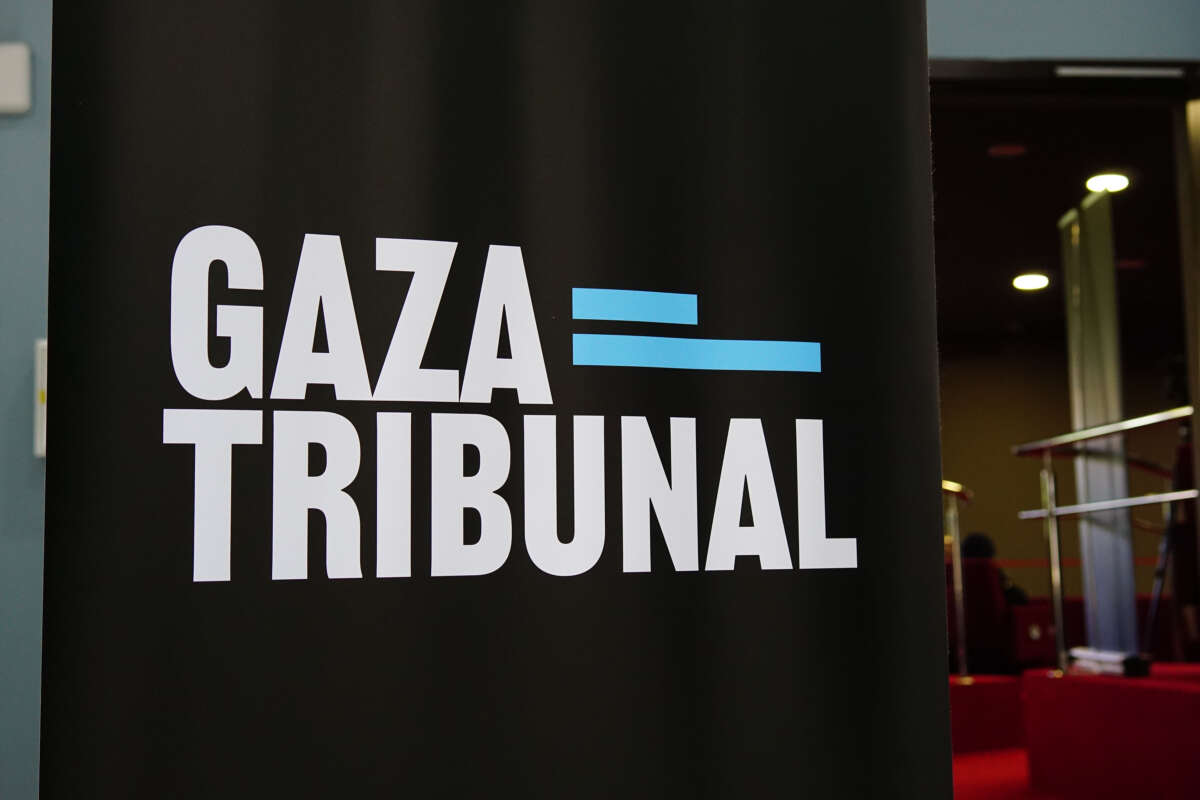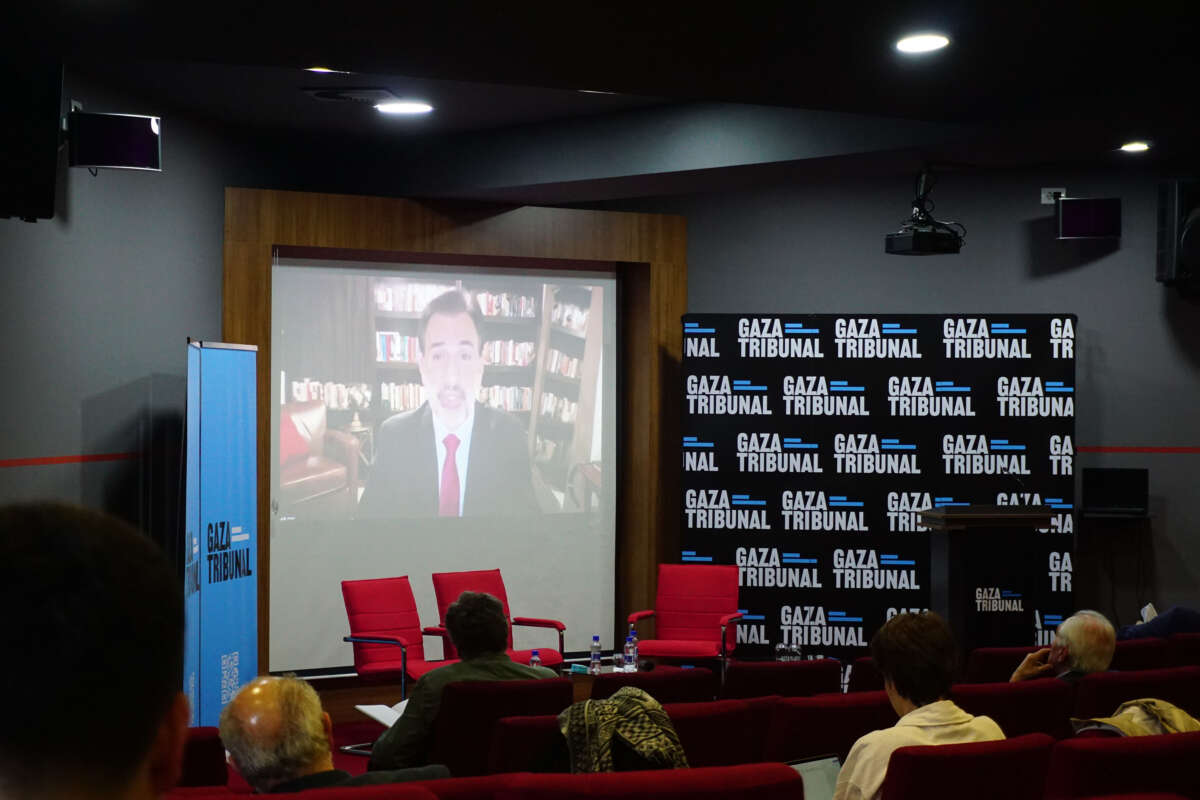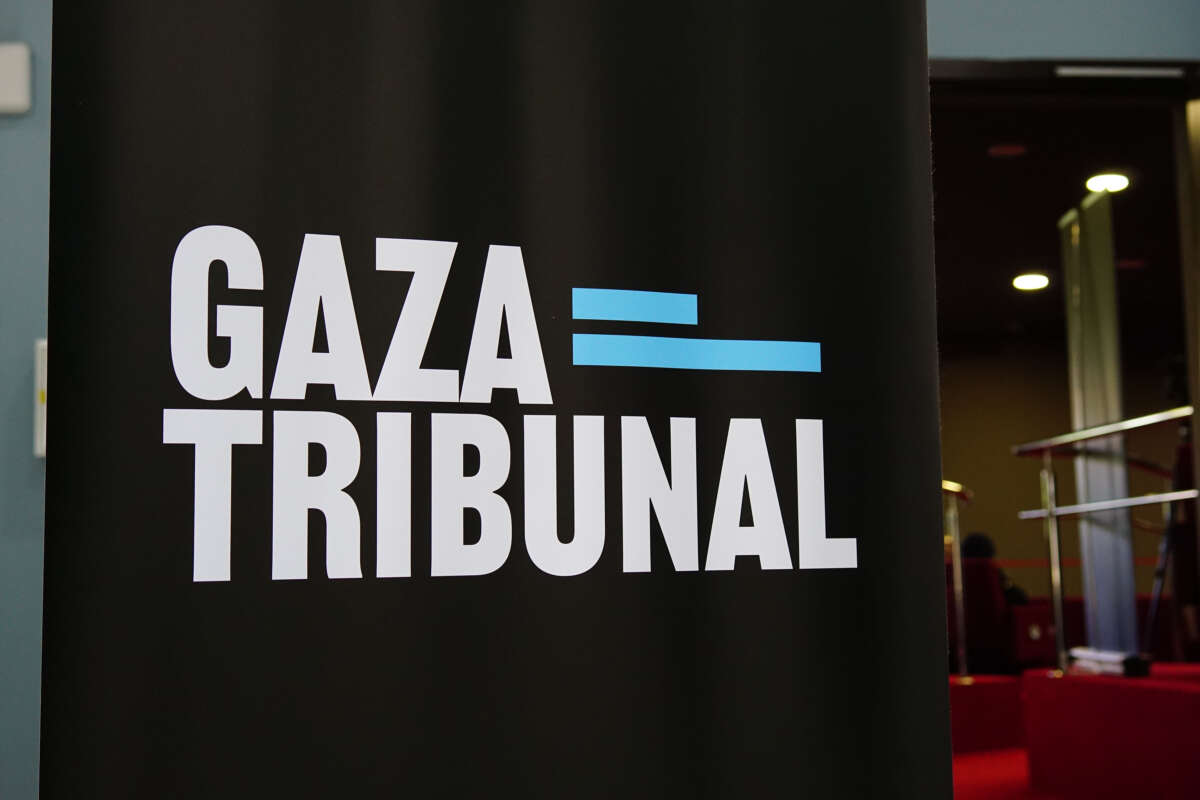Part of the Series
Struggle and Solidarity: Writing Toward Palestinian Liberation
Dozens of lawyers, academics, human rights advocates, and journalists from Palestine, Israel, and global civil society issued a call to conscience on May 29 from a gathering in the capital of Bosnia and Herzegovina. Dubbed the Sarajevo Declaration, the 2,000-word document was the culmination of the three-day preliminary hearing of the Gaza Tribunal, a newly formed people’s justice initiative aiming to voice “collective moral outrage” over what it described as Israel’s genocide of Palestinians and the decades of impunity for atrocities leading to it.
Throughout three eight-hour days, the tribunal heard 45 back-to-back testimonies of research and analysis on the conditions of life and death in Gaza and across the rest of the Occupied Palestinian Territories. The entries — about obliteration of cultural heritage, violations of reproductive and disability rights, the weaponization of accusations of antisemitism, capital accumulation on Gaza’s rubble and in the West Bank, and otherwise — made a case beyond the charge of genocide, which members of the tribunal and a growing proportion of the global human rights community view as fact. Unbound by formal procedure and jurisdiction, tribunal members also brought in analysis of the context predating October 7, 2023. All together, they built an argument that the present stage of genocide in Palestine is the logical end point of a Zionism’s project of domination initiated before 1948 — and that the exceptions that have allowed it have also undermined international law, global cooperation and the United Nations system for all.
Israel and those enabling its actions “want Gaza to be the graveyard of international law,” said Raji Sourani, a Palestinian attorney from Gaza and founder and director of the Palestinian Center for Human Rights in Gaza City, in his address at the close of the tribunal’s first day. “Not for Gazans, not for Palestinians, but for the whole world.”
The semi-closed session on the hushed campus of the International University of Sarajevo was the Gaza Tribunal’s first meeting, with the final verdict planned for a last session in October. The proceedings — in their quasi-academic format of panels, PowerPoints, and papers — were both desperate in their desire to impede atrocities and self-conscious of the impossibility to meet the present horror: Israel’s military has intensified its aerial bombardment and blockade of Gaza, in addition to opening fire on people queued for food, leading to some of the deadliest days since Israel broke the last ceasefire in March.

As Israel advances its campaign against Palestinians, the tribunal is among a wave of recent mobilizations attempting to intervene outside of traditional judicial, diplomatic, and humanitarian spaces. For example, the Freedom Flotilla, a civilian ship stocked with aid, was sailing through international waters in the Mediterranean Sea toward Gaza’s coastline when it was intercepted by Israeli forces, and the activists onboard were detained on June 9. That day, a group of organizations and activists began the Global March to Gaza from Tunisia, hoping to cross through North Africa to the Rafah border and negotiate entrance into the besieged Strip.
The Gaza Tribunal’s intended intervention is less direct. The initiative channels a tradition dating back to the Vietnam War, during which intellectuals and activists created the Russell Tribunal on U.S. War Crimes. Since then, people’s tribunals have convened civil society dozens of times to expose and protest atrocities against communities that the law has failed to protect or rendered expendable. Despite their name, these tribunals have no legal authority; they shed the trappings of the courtroom and presume the accused – powerful states – guilty. Organizers hope that this most recent iteration will process the overwhelming evidence from Gaza into a comprehensive historical record that can provide support to other efforts on narrative, political, and legal battlegrounds.

Richard Falk, president of the Gaza Tribunal, is a professor of law and former UN official on the Occupied Palestinian Territories who attended the first Russell Tribunal in 1967, and has since participated in and led numerous others. “The people’s tribunal seeks action … ranging from pressure on governments to cease supplying weapons and funds and on other parts of society to impose solidarity initiatives,” including Boycott, Divestment, Sanctions, Falk said in an interview prior to the tribunal’s meeting in Sarajevo.
Exceptions Are the Rule of Law for Palestine
By the time the international law chamber launched the first day of the Gaza Tribunal, the fact of genocide was plain, organizers said: Consensus had already developed among independent mechanisms of the United Nations, academics, experts, and human rights organizations such as Amnesty International and Human Rights Watch that Israel is violating the 1948 Genocide Convention; there was no denying 19 months of overwhelming, livestreamed evidence, they said.
Still, the chamber built its case, testimony laying the framework for analysis of genocide under international law followed by research and witness accounts of genocidal acts. Palestinian journalist Ahmed Abu Artema, in a pre-recorded audio entry from Gaza, described the hell of relentless forced evacuations as Israeli military demarcate neighborhoods for strikes. Thaer Ahmad and Mimi Syed, both physician volunteers who traveled to Gaza from the United States, spoke from the podium about providing medical care amid endless mass casualty incidents, medical supply shortages, and contaminated conditions. First-year university student Senad Bibanovich said their remarks were so appalling he felt ill simply from listening.
The Gaza Tribunal was therefore not charging Israel alone with genocide, which South Africa has already done before the International Court of Justice in a case now 17 months underway, in which the court has found it plausible that Israel is violating the Genocide Convention and ordered it in January 2024 to take measures to protect against further abuses in Gaza. Rather, the tribunal intended to spotlight how other states and the inadequacy of the international system have made genocide against Palestinians in Gaza possible.
“There is a clear problem in current mechanisms of prevention and accountability … because they have allowed for 19 months now these kind of crimes in plain sight to be committed,” said Nimer Sultany, international law scholar at SOAS University of London, author and member of the international law chamber, in an interview between sessions.
The task of the Gaza Tribunal is therefore “not related only to Gaza and Palestine exclusively; it’s also about why ‘Never Again’ did not work,” Sultany continued.
The diagnosis came with the next chambers, which dealt with the comparative, geopolitical, and historical dimensions of this and other genocides.
Explaining the abject failure of “Never Again” requires revisiting the beginning of the post-World War II international system, Craig Mokhiber, former director of the New York office of the UN High Commissioner for Human Rights, submitted in a virtual testimony on the tribunal’s second day. In 1948, the Universal Declaration of Human Rights and the Genocide Convention both came on the heels of the 1947 UN Partition Plan for Palestine. The first two created universal norms of self-determination and freedom from genocide; the other, Mokhiber said, ratified belligerent land theft and ethnic cleansing of the Nakba, the mass displacement of approximately 750,000 Palestinians from their homes between 1947 and 1949.

This confounded moment birthed what Mokhiber called “the Israel exception to international law … that has haunted [the UN] for decades, carved out space for genocide and ultimately threatened the very legitimacy and sustainability of the United Nations itself.”
“Selectivity and politicization of international law — that is the rule,” Palestinian human rights attorney Sourani said in his address.
Mokhiber said that the Israel exception is a symptom of what he called “the fundamental contradiction in international law: There are in fact two UNs.”
According to Mokhiber, the first UN is the one with deference to its own charter and human rights treaties; where colonization, apartheid, and genocide are universally prohibited. The second UN is the one that partitioned Palestine; that, during the three-decade Oslo Accords between the Palestinian Liberation Organization and Israel, “told the Palestinians they must negotiate for their rights with their oppressor” in a process mediated by the United States, “the world’s sole superpower, which also happened to be Israel’s closest ally and arms provider”; the UN that has been “silent on genocide, unable to call for ceasefire or accountability.”
What makes the latter more often the UN in force is the fact that there is no formal method outside the Security Council of enforcing human rights instruments, UN General Assembly resolutions, or International Court of Justice orders — such as its January 2024 provisional measures or its July 2024 opinion finding Israel’s occupation illegal, and requiring that other states not “render aid or assistance” toward maintaining occupation in the Palestinian Territories (a conclusion the United States has criticized as too broad). The Security Council enjoys a range of authorities, including imposing sanctions and military action; but its five permanent state parties — China, France, Russia, the United Kingdom, and the United States — have unchecked veto power on any council decision.
“What then can the UN, its member states and all who support its founding principles do to end a genocide, protect its victims and hold its perpetrators to account when a veto-wielding permanent member of the Security Council is itself implicated in the perpetration of a genocide and fully committed to its continuation?” Mokhiber asked.
On June 4, the United States vetoed a ceasefire resolution in the Security Council, bringing its total number of vetoes with respect to Palestine since October 2023 to six; since 1945, at least, the U.S. has vetoed at least 40.
The Tribunal’s Intervention
These exceptions and failures, and the disconnect between unprecedented popular solidarity with Palestinians and the continued diplomatic and military support by governments of Israel, demanded a tribunal come together, organizers said.
The tribunal form is “really key” for civil society to do what states and international institutions are not: “taking to task the governments who are complicit in these crimes, not relying on the incredibly slow process of the international legal order,” said Penny Green, a professor of law at Queen Mary University of London School of Law, and member of the steering committee who has participated in other tribunals past. “The wheels of international law turn so slowly, and then they are toothless.”
Yet, some have questioned what the tribunal can accomplish when the world has already been saturated daily by the evidence of the horror in Gaza and has still not been able to end an active genocide. Gianni Tognoni, the secretary general of the Permanent Peoples’ Tribunal, the institutional home for over 50 people’s tribunals worldwide, was in attendance. He pointed out in a conversation between panels this dilemma: In other cases, tribunals have served to give visibility to an injustice that has been ignored or covered up. “Here, the opposite: we have visibility in excess,” he said.
Though the tribunal doesn’t have legal or enforcement power, members anticipated it could serve as a source of mass, credible documentation for others to draw on in organizing political pressure on complicit actors and in future legal efforts toward accountability. Organizers said they are collecting all the material, including members’ oral testimony and reports into a single archive, from the session in Sarajevo and the second in October.
“This entire tribunal is really a complement to the efforts of Palestinian civil society as a whole that has been ongoing throughout this genocide in particular but for decades,” according to Wesam Ahmad, a human rights advocate at the Palestinian NGO Al-Haq and tribunal steering committee member. His hope is that the repository of the tribunal material could be marshaled in organizing on the ground.
How the tribunal specifically plans to support Palestinian and solidarity organizing was not made explicit; but one possible contribution it might make is to future criminal cases and lawsuits against Israel and other actors in formal courts, said Susan Akram, member of the tribunal’s steering committee and co-chair of the international law chamber.
Even the act of gathering together and naming the crimes can be significant if it’s brought back to people in Gaza, said Akram Lilja, a professor from Gaza and project lead on damage assessment of cultural heritage sites in Gaza, which includes 30 people on the ground. He can now tell his team in Gaza that there are people from Bosnia, New York, California, Turkey, “from every place around the world who know about you…. You are not alone.”
To some, the potential of people’s tribunals comes from their ability to source their principles outside international law, with its deep contradictions and inequities, and to act with immediacy, creativity, and moral clarity. Limited thus far to symbolic proclamations and with the Gaza Tribunal’s final judgment not expected until October, it remains to be seen what doing so will look like.
In his short address to the membership the day before the Sarajevo Declaration was ratified, Tognoni, the secretary general of the Permanent Peoples’ Tribunal, spoke plainly: The evidence of Israel and the world’s crimes “is so beyond a reasonable doubt it cannot be considered a juridical problem.”

The time has come, he asserted, to “stop talking about violations.” Those alive in Gaza “do not have the time to die and die and die” because of delays in “juridical qualification.”
Tognoni requested that the tribunal “have a judgment in real time while [Palestinians] are living and looking to the future. That is the main right of the Palestinian people, to have a future now.”
Keep the press free. Fight political repression.
Truthout urgently appeals for your support. Under pressure from an array of McCarthyist anti-speech tactics, independent journalists at Truthout face new and mounting political repression.
We rely on your support to publish journalism from the frontlines of political movements. In fact, we’re almost entirely funded by readers like you. Please contribute a tax-deductible gift at this critical moment!
Read full article at source
Stay informed about this story by subscribing to our regular Newsletter


